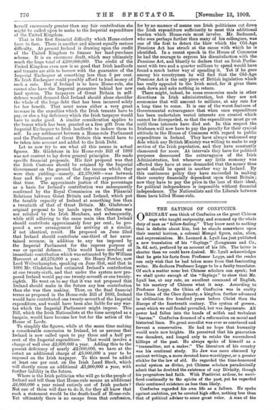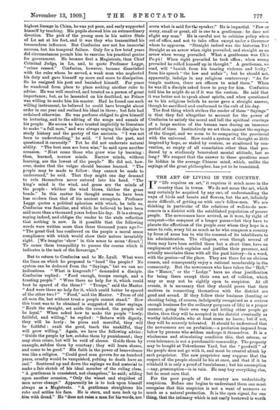THE SAYINGS OF CONFUCIUS.
ORDINARY men think of Confucius as the great Chinese sage who taught reciprocity, and summed up the whole duty of man as "fellow-feeling." They know next to nothing that is definite about him, but he stands somewhere upon their mental horizon, a colossal Mongol figure, calm, alien, and expressionless. Mr. Leonard A. Lyall has just published a. new translation of his " Sayings " (Longman and Co., 3s. 6d. net), prefaced by an account of his life. The latter is shorter than we could have desired. Mr. Lyall acknowledges that he gets his facts from Professor Legge, and the readez can only wish that he bad taken more from that fascinating writer. He declares Professor Legge to be a. faulty translator. Of such a matter none but Chinese scholars can speak; but we shall quote enough of the " Sayings " to show that Mr. Lyall has, at any rate, an excellent command of English, be his mastery of Chinese what it may. According to Professor Legge, the China of Confucius was in reality the China of the Chou dynasty, a kingdom further advanced in civilisation five hundred years before Christ than the Europe of the fourteenth century. The system of govern_ meet which we call feudal prevailed, but was degenerate. All power had fallen into the hands of selfish and turbulent " barons." Confucius dreamed of a reformation on moral and historical lines. No great moralist was ever so convinced and fervent a conservative. He had no hope that humanity would scale new heights. He perceived that his generation was decadent, and longed only to retake the surrendered hilltops of the past. He always spoke of himself as a "transmitter, not a maker." The literature of his country was his continual study. No Jew was more obsessed by ancient writings, a more devoted hero-worshipper, or a greater stickler for the law of old. He regarded the time-honoured social system as divine, yet Chinese scholars paradoxically admit that he doubted the existence of any Divinity, though his progenitors had faith. With Positivist ardour, he sacri- ficed continually to the spirits of the past, yet he regarded their continued existence as less than likely.
Confucius regarded his own life as a failure. He spoke against ambition, yet he coveted high office, nothing less than that of political adviser to some great ruler. A man of the highest lineage in China, he was yet poor, and early supported himself by teaching. His pupils showed him an extraordinary devotion. The pick of the young men in his native State of Lu sat at his feet, and it was they who transmitted his tremendous influence. But Confucius saw not his immortal success, but his temporal failure. Only for a few brief years did circumstances permit him to exercise his practical genius for government. He became first a Magistrate, then Chief Criminal Judge, in Lu, and, to quote Professor Legge, "crime ceased." Confucius, however, became dissatisfied with the ruler whom he served, a weak man who neglected his duty and gave himself up more and more to dissipation. So he resigned his post and banished himself. For years he wandered from place to place seeking another ruler to advise. He was well received, and treated as a person of great importance; but, as he lamented on his deathbed, no Prince was willing to make him his master. Had he found one such willing instrument, he believed he could have brought about order in one year and realised his ideal in three ; but fate had ordained otherwise. He was perforce obliged to give himself to lecturing, and to the editing of the songs and annals of his people. He seems to have trusted implicitly to literature to make "a full man," and was always urging his disciples to study history and the poetry of the ancients. " I was not born to understanding," he said. "I loved the past, and questioned it earnestly." Yet he did not underrate natural ability. "The best men are born wise," he said upon another occasion. "Next come those who grow wise by learning : then, learned, narrow minds. Narrow minds, without learning, are the lowest of the people." He did not, how- ever, desire that the vulgar should become learned. " The people may be made to follow : they cannot be made to understand," he said. That they might one day demand to rule themselves never entered into his head. " The king's mind is the wind, and grass are the minds of the people : whither the wind blows, thither the grass bends." In this matter his thought seems to have been less modern than that of his ancient exemplars. Professor Legge quotes a political aphorism with which, he tells us, Confucius was familiar, and which he believed to have been said more than a thousand years before his day. It is a strange saying indeed, and obliges the reader to the stale reflection that nothing is new. Is it possible that the following words were written more than three thousand years ago ?— " The great God has conferred on the people a moral sense compliance with which would show their nature invariably right. [We imagine `show' in this sense to mean 'direct'] To cause them tranquillity to pursue the course which it indicates is the task of the Sovereign."
But to return to Confucius and to Mr. Lyall. What were the lines on which he proposed to " bend " the people ? No system can be deduced from the " Sayings," but we can see indications. " What is kingcraft ? " demanded a disciple. Confucius replied: " Food enough, troops enough, and a trusting people." " Were there no help for it, which could best be spared of the three ? " " Troops," said the Master. " And were there no help for it, which could better be spared of the other two ? " " Food," said the Master. "From of old all men die, but without trust a people cannot stand." How this trust was to be obtained is suggested in other sayings. " Exalt the straight, set aside the crooked, the people will be loyal." When asked how to make the people "lowly, faithful, and willing," he replied : " Behave with dignity, they will be lowly : be pious and merciful, they will be faithful : exalt the good, teach the unskilful, they will grow willing." Again, we have the following advice : ." Guide the people by law, subdue them by punishment ; they may shun crime, but will be void of shame. Guide them by -example, subdue them by courtesy ; they will learn shame, -and come to be good." His faith in the power of benevolence was like a religion. " Could good men govern for an hundred years, cruelty would be vanquished, putting to death have an end." Scattered up and down the sayings we find material to make a fair sketch of his ideal member of the ruling class. "A gentleman is consistent, not changeless," he said; adding upon another occasion, " Only the wisest and stupidest of men never change." Apparently he is to look upon himself always as a Magistrate. "A gentleman straightens his robe and settles his face. He is stern, and men look up to _him with dread." He "does not raise a man for his words, nor, scorn what is said for tlo speaker." He is impartial. "Few or many, small or great, all is one to a gentleman : he dare not slight any man." He is careful not to criticise policy when out of office, and not to take office except under a Governor whom he approves. "Straight indeed was the historian Yii! Straight as an arrow when right prevailed, and straight as an arrow when wrong prevailed. What a gentleman was Ch'ii Po-yii ! When right prevailed he took office ; when wrong prevailed he rolled himself up in thought." A gentleman, we read, will " banish from bis bearing violence and levity," from his speech " the low and unfair "; but he should not, apparently, indulge in any religious controversy: "As for temple matters, there are officers to mind them." When he was ill a disciple asked leave to pray for him. Confucius told him he might do so if it was the custom. He said that it was better not to speak about spirits, and when questioned as to his religious beliefs he never gave a straight answer, though he sacrificed and conformed to the cult of his day.
The first thing which strikes the reader of these " Sayings " is that they fail altogether to account for the power of Confucius to satisfy the moral and lull the spiritual cravings of a large section of the human race during an immense period of time. Instinctively we set them against the sayings of the Gospel, and we seem to be comparing the provincial with the universal. How could a system of thought so little inspired by hope, so staled by custom, so straitened by con- vention, so empty of all consolation other than that pro- duced by a studiously benevolent mental attitude, last so long P We suspect that the answer to these questions must lie hidden in the average Chinese mind, which, unlike the sayings of the great philosopher, has yet to be translated.















































 Previous page
Previous page